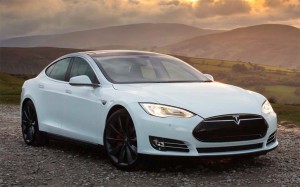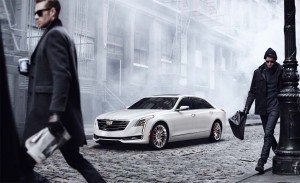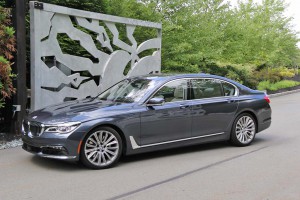“Keep your eyes on the road, your hands upon the wheel,” Doors frontman Jim Morrison sang in Roadhouse Blues. But that traditionally healthy line of advice soon may no longer be necessary.
With the debut of the 2016 BMW 750i, motorists will be able to take their hands off the wheel for as long as 15 seconds at a time, the car’s semi-autonomous technologies temporarily taking over driving duties. And a year from now, Cadillac is promising to go a step further. The Detroit maker’s new Super Cruise system will allow drivers to cruise well-marked freeways for an extended period of time hands-free. Or so Caddy can only hope.
Some automakers are promising to go even further, bringing fully autonomous vehicles to the road within the next decade. But it’s far from certain they can pull it off. It’s not necessarily the technical issues that could derail the push, but regulatory and insurance hurdles, industry leaders warn.
The new BMW 750i also will offer drivers the ability to get out of their vehicles, press a button on the keyfob and watch as the big sedan automatically parks itself in their garage. But that feature will, for at least the near future, only be offered in Europe.

Tesla is beta testing its "Pilot" mode that allows the car to drive autonomously on well marked roads.
“We’re seeking regulatory approval in the U.S.,” said BMW board member Ian Robertson, during a media preview of the new 7-Series line.
According to Robertson, the Bavarian maker could permit motorists to drive hands-free in the new luxury sedan for as long as they want on a well-marked road, but it doesn’t believe that would be permitted by regulators in the U.S. and many other parts of the world, at least not for now.
Autonomous vehicle proponents aren’t entirely without hope, however. They’re confident that self-driving technologies eventually will help slash the highway fatality rate which reached nearly 33,000 in 2013, the latest year for which statistics are available. With preliminary data suggesting highway deaths are on the rise this year after a lengthy decline, there’s a growing push for ways to reduce that carnage.
Among those who have suggested technology could help is Mark Rosekind, the new chief of the National Highway Traffic Safety Administration. But with NHTSA focused on a crackdown on safety defects, it’s anyone’s guess how quickly it will be willing – or able – to evaluate and approve new self-driving technologies.
The Insurance Institute for Highway Safety has praised more limited, semi-autonomous technologies, such as forward collision warning with autonomous braking – which can detect a potential crash and, if necessary, apply the brakes without a driver’s intervention. But major insurers have yet to say whether they will support or penalize more advanced technologies such as Cadillac’s Super Cruise.

When the Cadillac CT6 hits the road for 2017, it'll come equipped with the luxury brand's Super Cruise autonomous driving capability.
Insurance industry officials appear nervous about what to do next because if such systems prove less effective than promised there could be a rash of costly lawsuits and insurance claims.
That is leading some proponents to call on state and federal lawmakers to help move things forward, perhaps with legislation that would limit liability for autonomous technologies, much as some states have capped awards for malpractice. But with little hard, actuarial data to go by, that may be a hard sell in the near future.
(Tesla’s autonomous technology may lead to ride-sharing dominance. For more, Click Here.)
Andy Palmer, former global product development chief at Nissan, which hopes to launch a fully autonomous vehicle by 2020, warned that the U.S. could slip behind the rest of the world in the adoption of autonomous technology if regulators, lawmakers and the insurance industry don’t act soon. Now CEO of Aston Martin, Palmer believes many promising technologies will be left off U.S. models, as is happening with the BMW Auto Park system.
But the fact that the Bavarian maker is going ahead with the U.S. version of its semi-autonomous cruise control shows that American customers won’t be left out of the self-driving loop entirely.
(Click Here for details about BMW plans to redefine “the ultimate driving machine.”)
Tesla is already beta testing a similar technology, dubbed Pilot, and hopes to launch it on the Model S sedan in the coming months.
Nissan CEO Carlos Ghosn promises to introduce a series of more and more advanced semi-autonomous features starting next year that will lead up to the debut of its first fully autonomous model.
(To see more about the technology automakers add to vehicles that consumers may not want, Click Here.)
Advocates hope that if these technologies prove as effective as forward collision warning systems, regulators, lawmakers and insurance companies will soon come onboard, taking the necessary steps to permit U.S. motorists to take their eyes off the road and hands off the wheel.


No one should authorize use of any AV until it meets extremely comprehensive testing to see if it responds appropriately to all sorts of real world issues such as a bicyclist pulling up next to the AV at a traffic light (see link below), system sensor failures which are inevitable, computer signal scrambling, hacking, long tunnels without access to telecommunication signals, etc.
Only after passing a real world test of all of the potential AV challenges and only with a system that has failsafe design, redundant systems, appropriate limp mode, etc. should any AV be allowed on the roadways – ever. In addition there should be a ZERO tolerance for defects on AVs. If a defect is identified, all of the existing models with that potential defect should be parked until they are properly inspected, repaired and/or deemed to not have the defect, before they are allowed back on the roadways.
There is no rational reason to rush half-baked, dangerous AVs to the roadways or marketplace. Due diligence is paramount in this situation.
http://www.theregister.co.uk/2015/08/28/google_robocar_suffers_brain_freeze_after_seeing_hipster_cyclist/
And the flat earth herd mentality starts the sky is falling chant. The question is is what monopolistic interest do they take their orders from. Ah the money interests,
the seeds of doubt of partcular technology should always be planted its for the safety everybody. Always vague irrations though, like the salem witch trials. No truth only fears. Unless of course your selling whale oil and matches. But no witches.